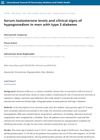 July 2021 in “International Journal of Community Medicine and Public Health”
July 2021 in “International Journal of Community Medicine and Public Health” Men with type 2 diabetes often have low testosterone and signs of hypogonadism, especially if they are overweight.
2 citations,
January 2016 in “Gynecological Endocrinology” A hidden autoimmune syndrome was found during a shock, showing thyroid, adrenal, and ovarian issues.
 21 citations,
July 2020 in “Stem Cell Research & Therapy”
21 citations,
July 2020 in “Stem Cell Research & Therapy” Fat stem cells from diabetic mice can still help heal wounds.
 14 citations,
September 2017 in “Clinics in Dermatology”
14 citations,
September 2017 in “Clinics in Dermatology” Skin diseases linked to insulin resistance should be managed to prevent diabetes and reduce heart disease risk.
16 citations,
October 2013 in “Irish Veterinary Journal” Oral feline interferon-omega improved symptoms in diabetic cats with gingivostomatitis.
 926 citations,
June 2010 in “BMC Medicine”
926 citations,
June 2010 in “BMC Medicine” Polycystic ovary syndrome is a complex condition that affects women's mental, reproductive, and metabolic health throughout their lives.
 February 2020 in “Research Square (Research Square)”
February 2020 in “Research Square (Research Square)” Skin tags in obese individuals may indicate a higher risk of heart disease and diabetes.
 31 citations,
January 2017 in “Advances in Experimental Medicine and Biology”
31 citations,
January 2017 in “Advances in Experimental Medicine and Biology” Low testosterone and 5α-reductase inhibitors can harm men's metabolic and sexual health; testosterone therapy may help, but discussing 5α-RIs' side effects is important.
 32 citations,
April 1999 in “Expert Opinion on Investigational Drugs”
32 citations,
April 1999 in “Expert Opinion on Investigational Drugs” Finasteride effectively treats male hair loss, improving growth and density.
 April 2023 in “Journal of Investigative Dermatology”
April 2023 in “Journal of Investigative Dermatology” Type 2 cytokines IL-4 and IL-13 increase skin's vulnerability to Staphylococcus aureus, which could be important for treating atopic dermatitis.
 October 2022 in “Frontiers in Cell and Developmental Biology”
October 2022 in “Frontiers in Cell and Developmental Biology” Aging skin is affected by inflammation, reduced stem cell function, and slower wound healing.
 6 citations,
April 2022 in “Journal of diabetes research”
6 citations,
April 2022 in “Journal of diabetes research” Type 2 diabetes slows down skin and hair renewal by blocking important stem cell activation in mice.
 48 citations,
February 2008 in “Nutrition in Clinical Practice”
48 citations,
February 2008 in “Nutrition in Clinical Practice” Dietary changes, including weight loss and a balanced diet, are important for managing PCOS, especially in overweight women.
 6 citations,
October 2000 in “International Journal of Dermatology”
6 citations,
October 2000 in “International Journal of Dermatology” Preventing hair loss is more effective than regrowth; oral finasteride is a realistic option.
 67 citations,
February 1997 in “Teratology”
67 citations,
February 1997 in “Teratology” Finasteride, when given in high oral doses to pregnant monkeys, caused genital abnormalities in male fetuses, but not in female fetuses or those exposed to intravenous finasteride.
 100 citations,
September 1999 in “British Journal of Dermatology”
100 citations,
September 1999 in “British Journal of Dermatology” The study found that two enzymes linked to hair loss are located in different parts of the scalp, supporting a common treatment's effectiveness.
 August 2023 in “Clinical, Cosmetic and Investigational Dermatology”
August 2023 in “Clinical, Cosmetic and Investigational Dermatology” Different types of female pattern hair loss have unique characteristics and are associated with various health conditions.
 20 citations,
January 2016 in “Open Journal of Endocrine and Metabolic Diseases”
20 citations,
January 2016 in “Open Journal of Endocrine and Metabolic Diseases” PCOS affects fertility and is linked to obesity and menstrual irregularities; lifestyle changes are recommended for treatment.
 27 citations,
December 2016 in “Dermatology and Therapy”
27 citations,
December 2016 in “Dermatology and Therapy” Certain skin conditions can indicate insulin resistance and should prompt lifestyle changes and medical treatment to manage underlying health issues.
 14 citations,
August 2022 in “Lupus Science & Medicine”
14 citations,
August 2022 in “Lupus Science & Medicine” SLE patients experience two patterns of non-inflammatory symptoms: intermittent and persistent.
 May 2023 in “International Journal of Home Science”
May 2023 in “International Journal of Home Science” PCOS is linked to metabolic issues and infertility, needing more research.
 16 citations,
November 2005 in “Journal of Investigative Dermatology Symposium Proceedings”
16 citations,
November 2005 in “Journal of Investigative Dermatology Symposium Proceedings” Blocking interferon-gamma helps prevent and treat hair loss in Alopecia Areata.
 28 citations,
November 2007 in “Medical Clinics of North America”
28 citations,
November 2007 in “Medical Clinics of North America” Obesity worsens Polycystic Ovary Syndrome symptoms, and weight loss is a key treatment.
66 citations,
October 2002 in “Human molecular genetics online/Human molecular genetics” A gene mutation in mice causes skin defects and early death.
 88 citations,
April 2011 in “Archives of Dermatology”
88 citations,
April 2011 in “Archives of Dermatology” Type 2 diabetes, bacterial scalp infections, and tight hairstyles like braids and weaves are linked to a higher risk of a scarring hair loss condition in African American women.
January 2014 in “프로그램북(구 초록집)” 5AR inhibitors like finasteride and dutasteride improve hair growth and slow hair loss in male pattern baldness.
 19 citations,
October 2004 in “Best Practice & Research in Clinical Obstetrics & Gynaecology”
19 citations,
October 2004 in “Best Practice & Research in Clinical Obstetrics & Gynaecology” The diagnosis of polycystic ovary syndrome (PCOS) requires a detailed patient history, ultrasound scanning, hormone level checks, and assessments of ovulation, obesity, and insulin resistance. It's a variable condition that needs individualized management and is a significant risk factor for type 2 diabetes.
 9 citations,
January 2007 in “Gynecological Endocrinology”
9 citations,
January 2007 in “Gynecological Endocrinology” A woman was the first known case to have both polycystic ovary syndrome and autoimmune polyglandular syndrome type 2, suggesting a need to check for both conditions in similar patients.
18 citations,
January 2018 in “Advances in experimental medicine and biology” Hair keratins evolved from ancient proteins, diversifying through gene changes, crucial for forming claws and later hair in mammals.
 2 citations,
January 2010 in “Hormone Molecular Biology and Clinical Investigation”
2 citations,
January 2010 in “Hormone Molecular Biology and Clinical Investigation” Low dose finasteride decreases certain steroids, possibly increasing depression risk.

























